Treating Candida Naturally:
The Top 17 Most Powerful Natural Antifungal Supplements and Herbs for Ridding the Body of Yeast
BY DR. LEON CHAITOW, N.D., D.O.,
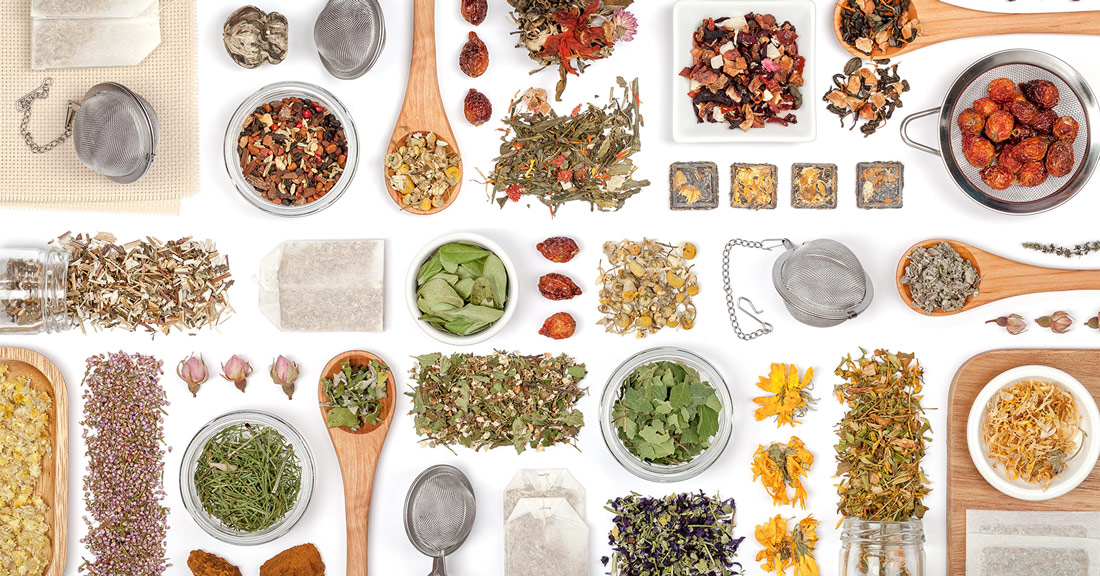 using special, naturally antifungal supplements and herbs is a powerful way to help rid the body of candida and yeast overgrowth that, when left unchecked, can lead to a variety of unpleasant health problems.
using special, naturally antifungal supplements and herbs is a powerful way to help rid the body of candida and yeast overgrowth that, when left unchecked, can lead to a variety of unpleasant health problems.
Controlling Candida Naturally: Supplements, Probiotics, and Herbal Extracts
In this article we will review a range of tactics that may be helpful to employ if the digestive tract has become inflamed, irritated or overrun by the activity of candida. If your symptoms seem to be indicating you that candida is a likely cause of your condition, then you can test this hypothesis by means of adopting an anticandida program including some or all of the antifungal supplements and herbs outlined below. If this succeeds in making a major improvement in your health by virtue of its controlling candida and improving your symptom picture, then you will have proved your assumption to be correct. In his book The Yeast Connection, Dr. William G. Crook calls this approach a “therapeutic trial.” It is really the only way of being absolutely sure, since there is as yet no way of definitively establishing whether candida is clinically involved in producing your symptoms by any laboratory tests.
This can be a stumbling block for people who insist on concrete proof that candida is the culprit. Yet all we can do is look at the current big picture of your health and add to this a review of your history. If it looks like a candida picture, then there really is no other choice than to introduce anticandida measures like natural antifungal supplements and herbs and a candida diet as well. If your fluid discharges, tissues, or excreta were cultured, the results would almost inevitably display candida’s presence somewhere in your body, which would not prove or disprove anything as far as your symptoms are concerned, since a positive test result could also be obtained from almost every adult both with and without symptoms. It is only by looking at known and suspected patterns and symptoms of candida activity that we can guess its active presence (as opposed to its benign presence if your immune system and intestinal flora are keeping it under control). Thus the only real proof is in treatment results. If you are better after using natural antifungals herbs and supplements and adopting a candida diet, then you will know that you assumed correctly and that your program is correct.
And at the very least you will have reformed your dietary habits and consumed some beneficial vitamins and other supplements, as well as strengthened your immune system’s ability to combat all its adversaries.
Can You Use the Same Antifungal Treatment for Yeast Infections, Thrush and Candida?
It is reasonable to question whether it is really necessary to attack candida with systemic supplements when it is obviously active in a local region (oral or vaginal thrush and yeast infections, for example) with an approach that is aimed at the intestinal tract. Fortunately, there is now ample evidence that this is the right way to tackle the problem. Researchers writing in the American Journal of Obstetrics and Gynecology detailed their findings in a study that involved 258 women with serious vulvovaginal candidiasis (also known as a common yeast infection), who were all assessed positive for intestinal candida activity. The patients were divided into two groups, one of which received antifungal medication both by mouth (for the intestines) and vaginally. The other group used antifungal medication locally in the vagina and additionally took a placebo.
The medication was used for just one week, and the women were reassessed after one week, three weeks, and seven weeks.
The results showed that 88 percent of those receiving both the digestive-tract and local antifungal treatment were clear of candida overgrowth, as opposed to the group that had intravaginal therapy alone, which had a 75 percent success rate. While this shows that significant, although not massive, improvements are achieved when both the local (vaginal) and the intestinal candida are addressed, the study also showed that recurrence of candida overgrowth is lessened among those women who take the dual approach. What this means is that if you treat local thrush and/or yeast-induced vaginitis locally, without treating the overgrowth in the intestinal tract, you will probably improve, but there will be an equal probability of a rapid recurrence. If the intestinal overgrowth is treated in addition to the local symptoms, however, recurrence becomes far less likely.
Controlling candida with natural antifungals involves a multipronged approach:
1. Avoid those factors that encourage yeast overgrowth, including, wherever possible, steroid and antibiotic medications.
2. Use natural antifungal products such as caprylic acid, berberine, garlic, and oregano oil, as well as nutrients such as biotin, which retard yeast from changing to its fungal form.
3. Stick to an anti candida diet, and absolutely avoid all sugar and refined carbohydrates.
4. Improve the health of the intestines, especially in relation to permeability (“leaky gut”), and recolonize the intestines with friendly bacteria (including the use of prebiotics and probiotics as described in this article).
5. Improve detoxification functions, specifically those involving the liver.
6. Enhance overall immune function by making changes in lifestyle and diet, and consider using vitamin/mineral and herbal supplementation.
The sequence in which the different elements of an anticandida program are introduced, which includes natural antifungal treatment, may need to vary, depending on the particular requirements of each person.
For example, sometimes it is necessary to spend some weeks supporting liver function so that it will be better able to handle the detoxification role it plays as yeast dies off. Or the digestive tract might require attention before anything else is attempted. Whatever sequence is adopted, the specific needs of the individual person must be the deciding factors as to the details of each aspect of the whole program.
Step 1: Avoid Anything That Supports Candida
Unless absolutely necessary, the contraceptive pill, hormonereplacement therapy, and steroid medications (such as cortisone) and antibiotics should be completely avoided for the duration of the natural anticandida treatment and supplementation program.
Dietary recommendations that support a healthy intestinal ecology are described fully in my book Candida Albicans: Natural Remedies for Yeast Infection, however, briefly here, the basic strategy should be to avoid foods that feed the yeast, such as sugar and refined carbohydrates (white flour products, for example). A high-fat intake and high stress levels, which can create an acidic environment in the digestive system, should also be avoided. Pre- and probiotics for candida are discussed below, including advice on how to encourage healthier, “friendly” bacteria. The bottom line is: the healthier your intestinal tract, the less chance candida has of invading and colonizing territory.
Step 2: Use Natural Antifungal Supplements
Just as different bacterial strains are resistant to particular antibiotics, so different strains of candida can be more or less vulnerable to different herbal products, supplements and drugs.
Recommended antifungal herbal extracts include caprylic acid, garlic, berberine, Kolorex (a natural candida remedy based on the ancient New Zealand herb horopito), oregano oil, and pau d’arco. Other antifungal supplements products are sometimes used, but the selection that follows includes those that I have found most useful over many years of naturally treating chronic candidiasis.
Caution: The herbal/plant extracts below should not be taken by pregnant or nursing women.
1. Caprylic Acid
This natural antifungal extract of the coconut palm destroys candida effectively.
Caprylic acid mimics the fatty acids produced by normal bowel flora, which are a major factor in the body’s control over candida. It has been successfully used in a time-release form that allows its release in the lower intestinal tract, as a treatment for those with severe intestinal candida. However, if not used in a time-release form, caprylic acid is less effective, as it is absorbed in the upper intestinal region. Caprylic acid is a natural candida treatment preferable over common antifungal drugs such as nystatin, which is itself yeast-based. Research at Wayne State University in Detroit shows that when nystatin treatment is stopped, even more colonies of yeast develop than were present before its use. Caprylic acid has no such rebound effect once you stop using it after candida is under control.
Caprylic acid is now widely available at health-food stores and some pharmacies. The suggested dosage varies, but good results treating candida have been obtained by using 1000 to 2000 mg of time-release capsules three times a day with meals. It is an alternative to using oil of oregano.
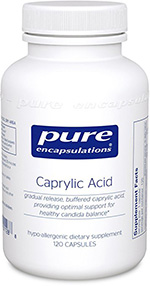 Conscious Lifestyle Recommends:
Conscious Lifestyle Recommends:
Pure Encapsulations Time-Release Caprylic Acid
Ultra-high quality time-release Caprylic acid designed to release in the lower gastrointestinal tract for maximum candida fighting ability. Free of all additives and binders, this is a potent natural antifungal supplement.
2. Undecylenic Acid (Calcium Undecylenate)
This is a safe and useful broad-spectrum natural antifungal supplement, a fatty acid extracted from castor bean oil. Its action is similar to, and usually more potent than, that of caprylic acid for treating candida. Undecylenic acid is a major ingredient of combination formulations that also contain caprylic acid and other antifungal herbs such as pau d’arco. As with caprylic acid, it is important to use time-release capsules of undecylenic acid to avoid it being absorbed too high up in the gastrointestinal tract, thereby not reaching its targets.
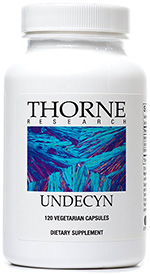 Conscious Lifestyle Recommends:
Conscious Lifestyle Recommends:
Thorne Research Undecylenic Acid (Calcium Undecylenate)
This powerful natural candida supplement is a blend of high potency time-release Calcium Undecylenate and the antifungal herb Barberry mentioned later in this article for maximum effectiveness.
3. Garlic
Garlic has been the subject of worldwide research. Studies have proved its long-reputed antimicrobial and antifungal properties, as well as its action against Salmonella typhimurium and Escherichia coli, two extremely active microorganisms. Garlic is extremely effective against yeast and fungi. It can easily be incorporated into one’s diet as a natural remedy for candida, used as a seasoning on cooked vegetables, or crushed into salads. Or you can simply eat the raw cloves or use it with fish or poultry as many Greeks do.
The suggested dosage is 400 to 600 mg three times a day with food (supplements should contain approximately 4000 mcg of allicin per capsule) or one clove of fresh garlic daily.
 Conscious Lifestyle Recommends:
Conscious Lifestyle Recommends:
Himalaya Herbs Organic Garlic Capsules
Ultra-high quality and purity organic garlic capsules in convenient vegetarian/vegan capsules. Free from all binders and additives—this is 100% pure garlic extract high in allicin and nothing else.
4. Berberine
Berberine is a quaternary ammonium salt from the protoberberine group of isoquinoline alkaloids. This natural antifungal compound is found in such plants as Berberis aquifolium (Oregon grape), Berberis vulgaris (barberry), Berberis aristata (tree turmeric), Hydrastis canadensis (goldenseal), Xanthorhiza simplicissima (yellowroot), Phellodendron amurense (Amur cork tree), Coptis chinensis (Chinese goldthread), Tinospora cordifolia (heartleaved moonseed), Argemone mexicana (prickly poppy), and Eschscholzia californica (California poppy).
Berberine has a wide spectrum of antibiotic activity against bacteria, protozoa, and fungi. Berberine’s action against Candida albicans has been shown to be more powerful than most medical drugs commonly used for these pathogens.
It has been shown to deactivate not only Candida albicans but ten other fungal species.
Berberine’s action against candida prevents its overgrowth after antibiotic use and also helps to repopulate the gut with friendly bacteria. In addition to being able to destroy bacteria, yeasts, and viruses, the naturally antifungal herbal compound berberine is also an antidiarrhea agent with immune-enhancing capabilities.
Suggested dosages as an herbal antifungal treatment for candida include three different options:
+ 1 to 2 g of dried bark or root of Berberis vulgaris or Hydrastis canadensis (powdered or as a tea) three times daily; or
+ 1 to 11⁄2 teaspoons (4 to 6 ml) of a tincture of either of these plants (diluted 1:5), three times daily; or
+ 1⁄4 to 1⁄2 teaspoon of a fluid extract of either of these plants, three times daily.
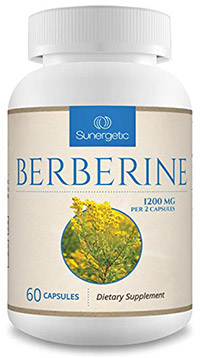 Conscious Lifestyle Recommends:
Conscious Lifestyle Recommends:
High Potency Berberine Capsules
A powerful extract of the natural antifungal herb, Berberis aristata (tree turmeric) rich in candida destroying berberine and other synergistic natural compounds.
5. Echinacea angustifolia (Purple Coneflower)
Purple coneflower, a North American plant species in the sunflower family, is a Native American antifungal herb that offers benefits similar to those of berberine in that it is a powerful antiviral and antifungal agent and an immune-system enhancer.
Some products combine echinacea, hydrastis, and berberine together with other immune-enhancing nutrients, such as zinc and vitamin C as a powerful anti candida supplement
The dosage recommendations for encapsulated products is 750 to 1500 mg daily in divided doses.
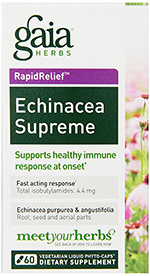 Conscious Lifestyle Recommends:
Conscious Lifestyle Recommends:
Gaia Herbs Organic Echinacea Capsules
Ultra-high quality time-release Caprylic acid designed to release in the lower gastrointestinal tract for maximum candida fighting ability. Free of all additives and binders, this is a potent natural antifungal supplement.
6. Horopito
The New Zealand plant of the Pseudowintera genus, commonly known as horopito, is the principal ingredient of Kolorex. This very slow-growing shrub has leaves that contain a strong natural antifungal agent, polygodial, which is a particularly effective remedy against Candida albicans. Studies have found that polygodial compares favorably with the powerful pharmaceutical antifungal amphotericin B. A study that tested eighty-two women with recurring vulvovaginal candidiasis over a period of twelve months found that horopito is “a natural antifungal phytocompound [that] proves to be as good as itraconazole in the maintenance treatment of RVVC [recurring vulvo-vaginal candidiasis].”
The recommended dosage for treating candida is one capsule containing approximately 350 mg daily of polygodial taken at the same time as 450 mg of anise seed (one capsule of each).
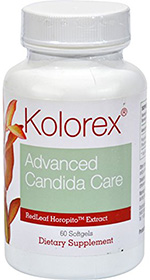 Conscious Lifestyle Recommends:
Conscious Lifestyle Recommends:
Kolorex Organic Horopito Extract Capsules
Ultra-high quality organic Horopito leaf extract in easy to swallow vegan capsules. Free of all additives and binders this is a powerful antifungal herb for killing candida.
7. Saccharomyces boulardii
Saccharomyces boulardii is a powerful antifungal yeast supplement derived from the lychee and mangosteen fruit, and it is used as a probiotic for candida and to re-introduce friendly bacteria into the gut. It is recommended for all anticandida treatment programs. Recommended dose is 250 mg twice daily. It should be noted, however, that in some severely immunocompromised individuals, S. boulardii has been associated with fungemia, or localized infection, which may be fatal.
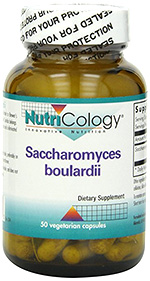 Conscious Lifestyle Recommends:
Conscious Lifestyle Recommends:
Nutricology Saccharomyces Boulardii Probiotic Capsules
High-potency, room temperature stable Saccharomyces Boulardii probiotic capsules with 9 billion CFU’s per serving. Taken orally this anticandida supplement produces lactic acid, supports the production of secretory IgA, and helps friendly probiotic bacteria to colonize the GI tract.
8. Grape Seed Extract
Grape seed extract is a proven antibacterial, antiviral, antiparasitic, and antifungal agent, with a high success rate for eliminating candida. In one study it was found that “GSE alone inhibited growth of C. albicans yeast cells, and that in a murine model of disseminated candidiasis, mice groups given GSE before intravenous inoculation with the yeast cells survived longer than diluent-received (control) mice groups (P<0.05). This GSE antifungal effect was dose-dependent.”
As part of an anticandida supplementation program between 100 and 200 mg daily is recommended.
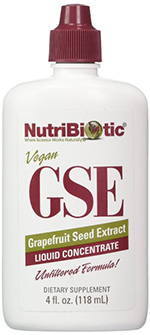 Conscious Lifestyle Recommends:
Conscious Lifestyle Recommends:
Nutribiotic Grapefruit Seed Extract Liquid Concentrate
Hands down the most potent and effective Grapefruit Seed Extract product available for fighting candida. A little goes a long way with this powerful antifungal supplement.
9. Oil of Oregano
The essential oil of oregano contains powerful natural antifungal compounds. Side effects are minimal, although allergic reactions to oregano oil can occur, therefore you should stop taking oregano oil if allergic signs or symptoms appear. This is one of the most useful natural antifungal herbs and is widely available.
One study found that “both the oregano and Mexican oregano essential oils showed high levels of antifungal activity against… fluconazole-susceptible C. glabrata” subjects.
If possible, oregano oil should be taken in an entericcoated capsule, which delays its release until it reaches the intestinal tract. The recommended dosage for treating candida is 0.2 to 0.4 ml of an enteric-coated capsule twice a day between meals as an alternative to caprylic acid or calcium undecylenate.
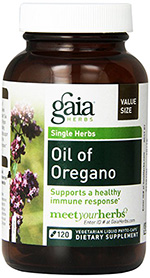 Conscious Lifestyle Recommends:
Conscious Lifestyle Recommends:
Gaia Herbs Oil of Oregano Liquid Phyto-Capsules
Ultra fresh, wildcrafted oregano leaves are harvested and pressed to make this potent naturally antifungal oil. Rich in immune boosting and candida killing carvacrol.
10. Pau d’Arco
The inner bark of a South American tree of the Tabebuia genus has a long history of folk use in the treatment of a wide variety of afflictions. Researchers have shown that pau d’arco extracts (containing lapachol) have strong antifungal actions and are particularly effective against Candida albicans. Pau d’arco is a naturally antifungal herb commonly taken in the form of a tea, consumed several times daily.
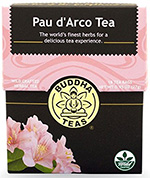 Conscious Lifestyle Recommends:
Conscious Lifestyle Recommends:
Buddha Teas Organic Pau D’Arco Bark
Rich in lapachol, this natural antifungal herb makes a pleasant tasting tea with powerful candida destroying properties.
11. Aloe Vera
The juice of this desert plant is a powerful natural antifungal herbal agent.
The healing qualities of aloe vera have been known since Phoenician times. In recent years, attention has been drawn to its usefulness in a range of digestive conditions. Jeffrey Bland, a widely recognized authority in the nutritional medicine field, has demonstrated that the activity of the fresh juice on candida can help sufferers. In a study published in Preventive Medicine he says:
The effect of Aloe vera juice supplementation appeared to be that of altering colonic biota. Those subjects that had heavy overgrowth of fecal bacteria and some yeast infection were found to have improved fecal colonization and decreased yeast after the Aloe vera juice supplementation. This may indicate that the Aloe vera contains an agent or agents which are mycostatic or bacteriostatic or that the improved gastrointestinal function and altered pH of the bowel as it relates to Aloe vera juice supplementation sets the stage for different populations of [friendly] bacteria to flourish in the gut.
Aloe vera juice has a similar effect on bacterial and fungal infections of the skin, and it can be applied locally. One or two teaspoonfuls of aloe vera juice in water should be taken twice daily by anyone with candida problems as a natural antifungal supplement. (Note: once opened, aloe vera juice should be kept refrigerated. The optimum shelf life after opening is about one month.)
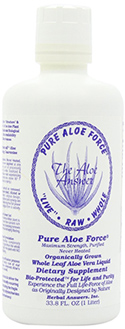 Aloe Force Raw Organic Aloe Vera Juice
Aloe Force Raw Organic Aloe Vera Juice
Aloe Force’s Aloe Vera Lef Juice is hands down the highest quality product available on the planet outside of directly eating the gel from fresh wild growing leaves. Since most people don’t have access to that, this is the next best thing. Aloe Force uses a special low-temperature, ultra-sensitive processing method to extract the leaf juice and maintain all heat-sensitive compounds intact for maximum antifungal and candida fighting effects.
12. Tea Tree Oil
This remarkable extract of the Australian plant Melaleuca alternifolia has powerful natural antifungal properties. Douching daily with a 1 percent solution in water (or, once a week, soaking a tampon into such a solution and inserting it into the vagina as a pessary, leaving it there for no more than 24 hours) can be very helpful as a natural treatment for vaginitis or cervicitis. This approach is useful whether the cause is candida or trichomonas. Tea tree oil can also be used as a gargle or mouthwash (one drop in a tumbler of water) for oral thrush, or applied directly onto the skin as an ointment. It is somewhat irritating to the skin if used neat as an oil, but there are many products with a 15 percent tea-tree-oil content that are relatively nonirritating and are great antifungal supplements.
![]() Conscious Lifestyle Recommends:
Conscious Lifestyle Recommends:
Plant Therapy Organic Tea Tree Oil
This therapeutic grade organic essential oil is a powerful natural antifungal with many uses. Ultra-pure and ideal for yeast infection, thrush and more.
13. Chamomile
The plant known as Matricaria chamomilla contains antifungal substances in its oil extract. Used as a tea or for topical application, it has soothing qualities similar to pau d’arco and can be a more mild remedy for candida.
![]() Conscious Lifestyle Recommends:
Conscious Lifestyle Recommends:
Alteya Organics USDA Organic Chamomile Oil
This therapeutic grade organic Chamomile essential oil is perfect for more gentle or topical uses. One drop can be diluted in warm water to make a pleasant, calming tea.
14. Tannate Plant Extracts
Plant extracts called tannates (such as the tannin in tea) are powerful natural antifungal agents. When taken orally, they destroy yeasts selectively, including their spores, without harming the natural flora of the body. There are also formulations for use in the mouth when candida is locally active, and for intravaginal use when thrush is evident. An advantage of using tannates as an herbal antifungal treatment for candida is that they act only in the digestive tract and are not absorbed at all elsewhere, unlike fatty acids, which may be absorbed too high up in the digestive tract unless delivered in suitable time-release capsules.
Additionally, tannates are also useful for detoxifying heavy metals from the body and are therefore suitable for use when mercury toxicity, for example, is a factor in immunosuppression.
Up to six (but usually three) capsules of 600 mg each of tannate products are suggested with every meal for up to eight weeks for naturally treating chronic candidiasis. Avoid taking tannate tablets on an empty stomach.
15. Antiparasitic Herb and Plant Extracts
Extracts of citrus (usually grapefruit) seeds have been promoted as safe, natural anticandida and antiparasitic agents. In one Polish study researchers concluded “that 33% grapefruit extract exerts a potent antifungal activity against the yeastlike fungi strains [i.e., candida] and had low activity against dermatophytes and moulds.”
Additional antiparasitic herbal assistance is found with berberine (see above) and also Artemisia annua, a traditional Chinese herb (not to be confused with Artemisia absinthum, a traditional European herb that can be toxic and is illegal in some countries) that is commonly combined with grapefruit seed extract as a naturally antifungal and antiparasitic medicine. A number of safe, antiparasitic herbal combinations are available at health-food stores. Most are effective treatments against both yeasts and parasites, such as combinations of antifungal herbs like berberine, artemisia, and grapefruit seed extract.
 Conscious Lifestyle Recommends:
Conscious Lifestyle Recommends:
Gaia Herbs Organic Antiparasite Blend (Wormwood + Black Walnut)
This organic herbal formula is a blend of wormwood, black walnut hulls, clove and gentian, ginger, coptis root and other powerfully anti-parasitic herbs.
16. Biotin
Biotin, a water-soluble B vitamin (vitamin B7) that acts as a natural antifungal supplement, is an important nutrient that combats candida activity when taken with probiotic supplementation. One study showed that biotin inhibits the formation of hyphae, the branching filaments produced by candida species that can penetrate soft tissue (and may cause leaky gut syndrome in the case of intestinal candida).
Biotin deficiency produces a number of skin conditions, including a dermatitis that is characterized by a grayish, dry, flaky appearance. This is accompanied by a lack of appetite, nausea, lassitude, and muscle pain. It is noteworthy that all of these symptoms are also commonly seen when candida proliferates, and it is worth questioning whether the supposed symptoms of biotin deficiency are not at least in part the result of the candida activity brought about by the deficiency.
Egg whites contain a substance called avidin, which is capable of combining with biotin, thus neutralizing its usefulness in the body. For this reason, raw egg should not be included in the anticandida diet and supplementation protocol (although avidin is destroyed by cooking, so cooked eggs are ok).
Biotin should be taken as an antifungal supplement three times daily (between meals) in doses of 350 to 500 mcg, in association with Lactobacillus acidophilus.
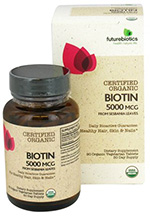 Conscious Lifestyle Recommends:
Conscious Lifestyle Recommends:
Futurebiotics Organic Whole Food Biotin
More powerful and bioavailable than synthetic versions, this whole food Biotin formula supplies the body with readily usable Biotin that is a powerful candida-preventative and natural antifungal.
17. Olive Oil
Olive oil is a further natural antifungal aid in the prevention of the transformation of candida to its mycelial form. Olive oil contains oleic acid, which acts on the yeast in a similar way as biotin, making it a great natural antifungal supplement. The recommended amount of olive oil is six teaspoons daily, divided into three doses. This can be included in the meal (added to salad or cooked vegetables), or taken before or after meals as desired. Ensure that the olive oil is virgin, coldpressed, and organic.
This piece on treating candida albicans naturally with antifungal supplements and herbs is excerpted with permission from Candida Albicans: Natural Remedies for Yeast Infection by Leon Chaitow.
About The Author
Leon Chaitow ND, DO graduated from the British College of Osteopathic Medicine in 1960. Since 1983 he has been a visiting lecturer at numerous chiropractic, physiotherapy, osteopathic, naturopathic and massage schools in Europe, USA, Canada, Australia. He was the first naturopath/osteopath appointed as a consultant by the UK government to a medical practice. For 11 years he was a Senior Lecturer at the University of Westminster. He is author/editor of over 70 books and founding Editor-in-Chief of peer-reviewed & Medline indexed Journal of Bodywork & Movement Therapies.
He was awarded an Honorary Fellowship by the University in November 2005 for “services to Complementary and Osteopathic medicine”. He continues to teach and practice part-time in London, when not in Corfu, Greece where he focuses on his writing and enjoys his garden with his adored wife of 42 years, Alkmini. Visit his website at LeonChaitow.com.



